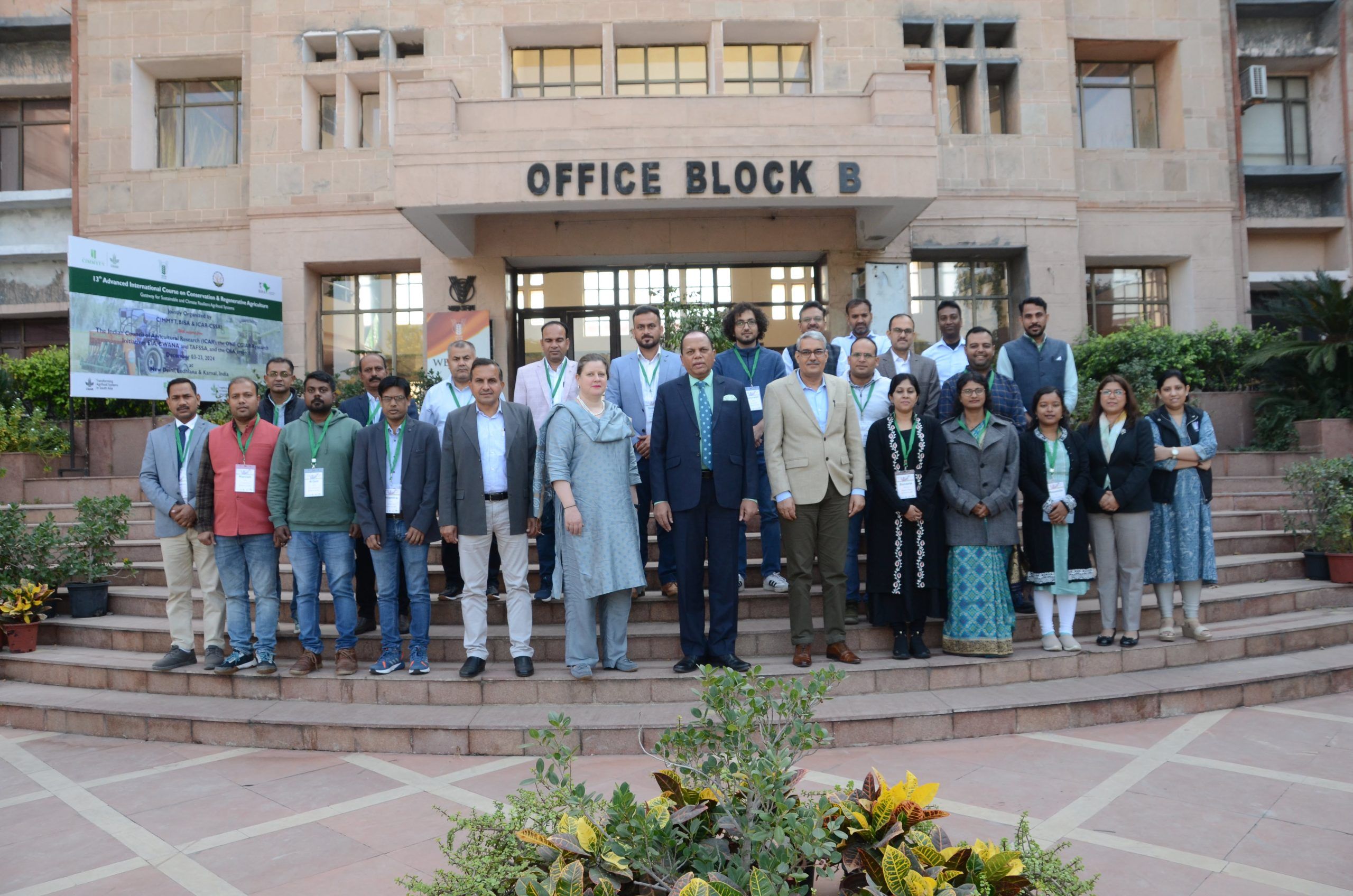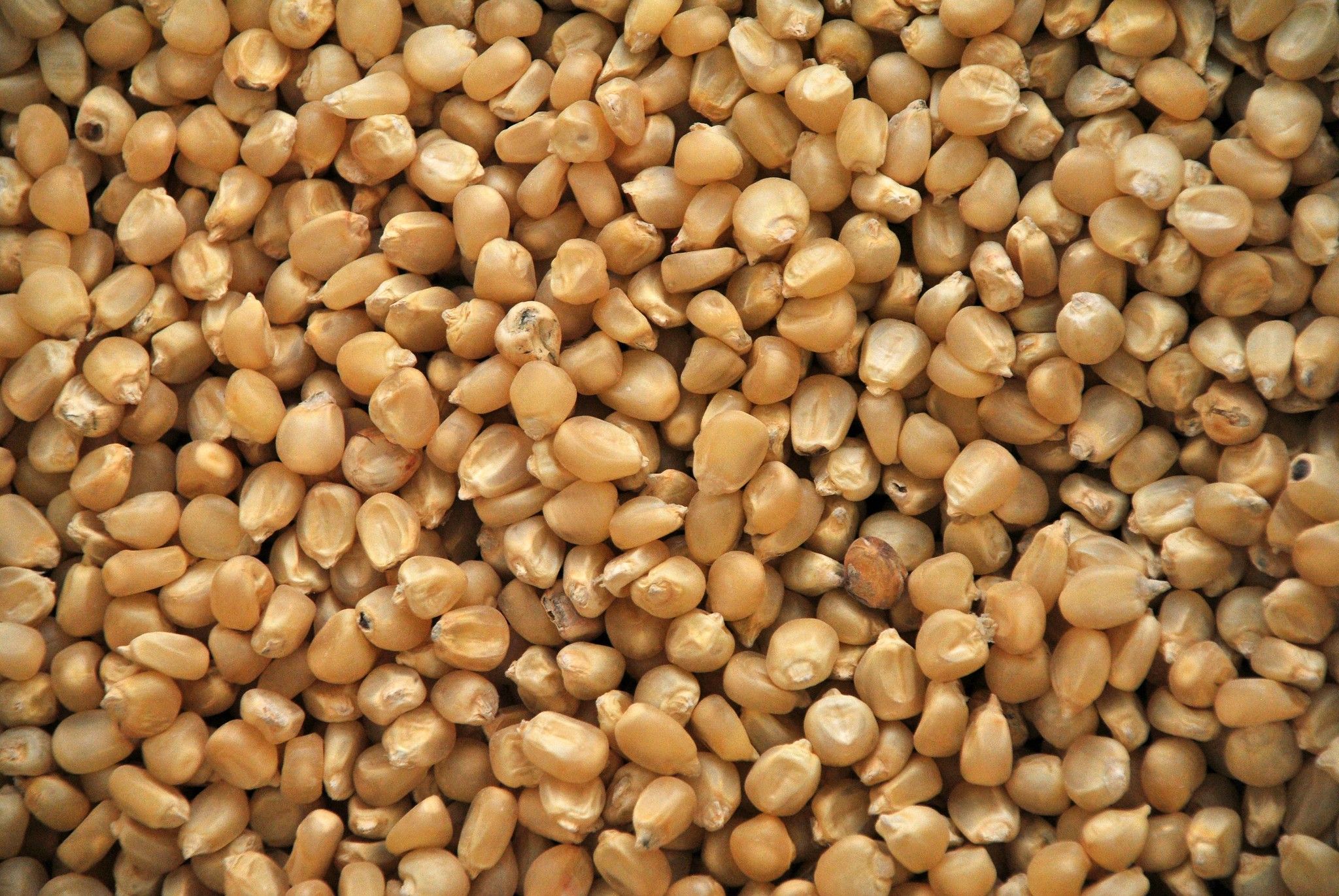Advanced Training in Conservation Agriculture: Fostering Sustainable Agronomic Systems

CIMMYT, the Borlaug Institute for South Asia (BISA), and the Indian Council of Agricultural Research (ICAR) jointly organized a three-week training course on conservation agriculture (CA) and regenerative agriculture (RA). The program focused on the potential of sustainable farming methods as vital tools for managing risks in agrifood systems in both irrigated and rainfed areas.
Held from December 3–23, 2024, the training brought together farmers, scientists, and stakeholders to explore innovative solutions to agrifood challenges. Sessions were held at the ICAR Indian Institute of Maize Research and BISA in Ludhiana, Punjab; the ICAR-Central Soil Salinity Research Institute in Karnal, Haryana; and the ICAR-Indian Institute of Farming Systems Research in Meerut, Uttar Pradesh, India.
Building Resilient Agrifood Systems
Conservation agriculture (CA) and regenerative agriculture (RA) are approaches to land management that prioritize ecosystem health. These practices are based on three core principles: minimal soil disturbance, continuous soil cover, and crop diversification. Together, they improve yields, restore natural resources, reduce farming costs, and develop resilient agricultural systems that protect the environment, enhance climate resilience, and improve rural livelihoods, particularly in the Global South.
In South Asia, where rural communities rely heavily on natural resources, farmers face significant challenges, including loss of soil fertility, water scarcity, pollution, and the effects of climate change. These pressures are straining agricultural systems, particularly in irrigated and dryland farming areas.
Despite the clear benefits of CA, adoption remains limited due to barriers such as lack of knowledge on how to implement CA in different agro-ecologies, limited access to appropriate tools, insufficient policy support, and low awareness of the long-term benefits of CA. To address these challenges, training and capacity development are essential for scaling up CA technologies among smallholder farmers and ensuring their long-term impact.
The Advanced Course on CA/RA in Asia was launched in 2010 by CIMMYT in partnership with the Indian Council of Agricultural Research (ICAR) to address the challenges of sustainable agriculture. Since its inception, advanced training workshops have been held annually, and this is the 13th edition.
The training bridges cutting-edge scientific research and multidisciplinary strategies, equipping participants with skills in sustainable intensification, diversification of production systems, resilience-building, and natural resource conservation. To date, CA training has benefited more than 220 researchers, policymakers, and development practitioners from 20 countries.
The 13th edition, held in India, welcomed mid-career researchers from Uzbekistan, Morocco, and India. The course was coordinated by Mahesh Gathala, Cropping Systems Agronomist, and Alison Laing, Agroecology Specialist, both from CIMMYT; Madhu Choudhary, Senior Scientist at ICAR-CSSRI; and Raj Kumar Jat, Senior Scientist at BISA.
Key Highlights of the Advanced Conservation Agriculture Training Course
The Advanced Conservation Agriculture (CA) course was inaugurated on December 4, 2024, at the NASC Complex in New Delhi. The inaugural address was delivered by S.K. Chaudhari, Deputy Director General for Natural Resource Management at ICAR, who highlighted the importance of CA in addressing climate challenges and managing agronomic risks. Chaudhari emphasized CIMMYT’s leadership in promoting CA in India and reflected on the impact of the program, saying, “I have been watching this course for many years. Many young scientists have benefited from this course.” He also fondly recalled the inaugural training session held 13 years ago and extended his best wishes to all the participants. Watch his complete statement here.

During the course, participants explored a wide range of topics related to conservation agriculture (CA) and regenerative agriculture (RA) in different agro-ecologies. Key areas of focus included the role of emerging technologies such as drones, carbon credits, soil fertility, nutrient management, crop modeling, and soil testing in informing policy. Experts from various scientific disciplines provided valuable insights into cutting-edge research for both irrigated and dryland systems.
At BISA’s research station in Ludhiana, participants gained practical experience through hands-on training sessions conducted under the expert guidance of H.S. Sidhu and Manpreet Singh (both from Punjab Agricultural University), with the support of Pardeep Sangwal (BISA).

The training included field visits to ICAR-CSSRI in Karnal, where Director R.K. Yadav, Madhu Choudhary, and Kailash Prajapat presented the Institute’s long-term conservation agriculture (CA) experiments. They also conducted hands-on demonstrations on soil biology and its role in generating evidence for policy decisions.
In addition, Mahesh Gathala conducted hands-on training in basic soil physical and chemical analysis techniques at joint ICAR-CIMMYT field plots in Karnal.
Special visits were organized to innovative agricultural machinery manufacturers, including Landforce and National Agroindustry, where participants observed advanced manufacturing techniques and explored the latest agricultural equipment.
Participants also interacted with the manufacturers’ association at the 5th India International Agri Expo in Ludhiana, gaining insights into emerging trends in agricultural machinery.

In addition, a village visit outside Karnal gave participants the opportunity to interact with farmers practicing conservation agriculture (CA). Farmers shared their experiences, giving participants a first-hand look at the practical benefits and real-world impact of CA on farming communities.

The success of the program underscores the importance of continued collaboration and training in advancing sustainable agricultural practices. By equipping participants with practical skills, cutting-edge knowledge, and opportunities to connect with peers across regions, the training was instrumental in advancing conservation agriculture (CA) and regenerative agriculture (RA).
Participants left the program with enhanced technical expertise, greater confidence in applying CA practices, and valuable insights into emerging areas such as carbon credit schemes and innovative agricultural technologies. These results underscore the critical role of capacity development in strengthening food security, building climate resilience, and promoting sustainable development in the Global South.

